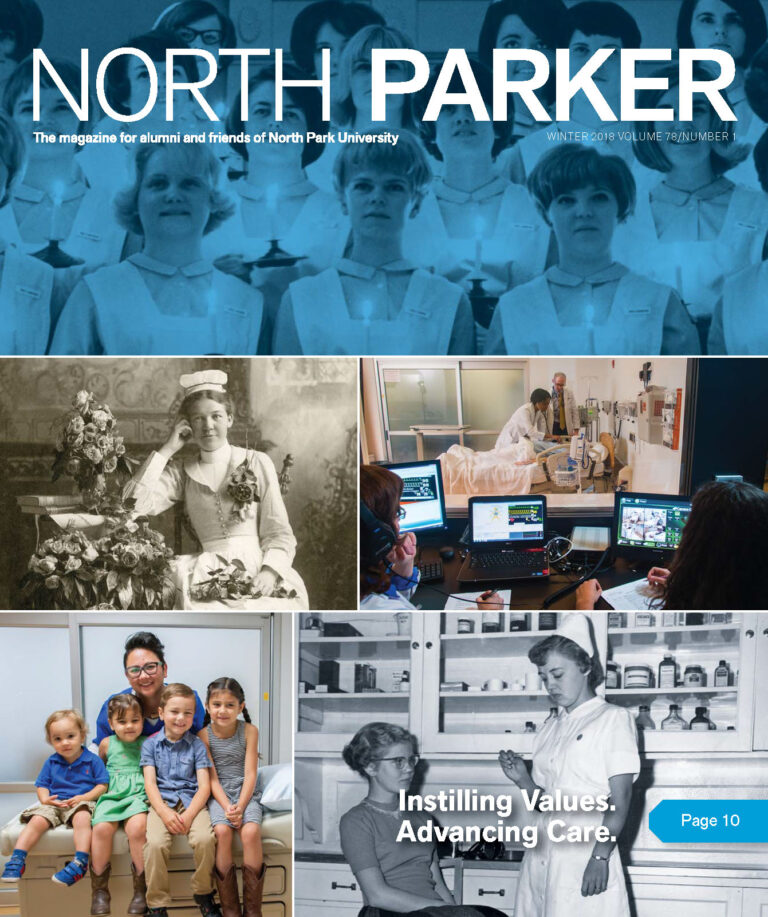 North Park welcomed Dr. G. Timothy Johnson C’56 S’63 back to campus on September 14 to discuss the future of American healthcare. The student-only event was held in the Nancy and G. Timothy Johnson Center for Science and Community Life, the building named to honor him and his wife Nancy. His talk also was live-streamed into three overflow classrooms and online.
North Park welcomed Dr. G. Timothy Johnson C’56 S’63 back to campus on September 14 to discuss the future of American healthcare. The student-only event was held in the Nancy and G. Timothy Johnson Center for Science and Community Life, the building named to honor him and his wife Nancy. His talk also was live-streamed into three overflow classrooms and online.
Dr. Johnson graduated from North Park Junior College in 1956 and earned a degree from North Park Theological Seminary in 1963. After completing his medical degree, he served as chief medical editor for ABC News from 1984 to 2010. He became one of America’s best-known physicians, providing award-winning on-air medical analysis on Good Morning America, World News Tonight, Nightline, and 20/20.
The following is a brief summary of Dr. Johnson’s talk: See it in its entirety at vimeo.com
Most experts today conclude that there are three major problems with healthcare in the United States, and we’ll look at each one:
• Cost control
• Quality assurance
• Affordable access
Cost control. Annually, we spend $10,000 per person for healthcare in the United States. For all other developed countries in the world, if you take an average per-person cost for healthcare, it’s about $5,000 per year.
Spending twice as much is fine if we had longer life expectancies and better outcomes. But we don’t.
So, why do we spend so much more on healthcare than all other developed countries?
First, we, as consumers, typically think the newest treatment or drug is best for us; we believe in the power of scientific innovation. Second, the healthcare industry keeps pouring out more drugs, devices, treatments, and tests that further feed our expectations about what we think we must have.
Together, industry and consumers create a powerful force that drives up healthcare costs. In fact, the inflation rate for healthcare is usually twice the rate of inflation for the general economy. And many economists are clear: If we don’t figure out how to handle healthcare costs, we’re headed for disaster.
Many healthcare economists also estimate that about one-third of what we spend on healthcare is spent unnecessarily on what is no better than what we already have. Since we will spend $3.2 trillion this year, one-third is over $1 trillion! Yet, we do this all the time: Rush out with new treatments without fully knowing the benefits, which drives up costs, consumer expectations, and potential risks for patients.
Quality assurance. Here in the United States, we have many places with the best available healthcare in the world. Most places offer good care, but there are many places in this country that do not.
Why? Because we have no mechanism to ensure that quality care is provided uniformly throughout our country.
Compare this to the airline industry. The federal government lays down the law as to when planes need to be inspected and pilots recertified. Instead, how would you like to leave airline safety up to each state to decide? There’s a push to turn healthcare back to the states. Sounds great on paper, but I’d be very nervous about individual states, on their own, deciding about quality. I want real experts at the national level laying down uniform quality standards.
Affordable access. We are the only developed country in the world that has not yet figured out how to provide universal health insurance. All other developed countries have done so. The Obama plan helped about 20 million people get insurance, but another 30 million Americans still don’t have health insurance.
If we’re not going to let people die in the streets (and we won’t), we have to figure out the most cost-effective ways to get everyone treated, instead of having many rely on the ER as their plan.
Morally, we have to ask: Is healthcare a right or a privilege? It’s debated all the time.
When I think of a privilege, I think of a new house, a new car, a new refrigerator—none
If we’re not going to let people die in the streets (and we won’t), we have to figure out the most cost-effective ways to get everyone treated, instead of having many rely on the ER as their plan.
Morally, we have to ask: Is healthcare a right or a privilege? It’s debated all the time.
When I think of a privilege, I think of a new house, a new car, a new refrigerator—none of these is guaranteed. When I think of a right, I think of police and fire protection, and I like to think of healthcare as health protection. So, why not provide people with health protection?
My position is that, financially and morally, healthcare should be thought of as a basic right to provide to all of our citizens.
So, what do we do about healthcare in the United States?
This really is a problem for younger generations to figure out. But here are a few ideas on what to consider.
Ensure a sound political system by electing people who can deal with this issue in positive, financially sane, and humane ways.
Any good healthcare system also should have certain qualities. First, it should spread the risk as widely as possible. Medicare does this by spreading the risk over all people over age 65.
Second, good health insurance has to be consistently available, no matter where you live or move. Again, Medicare is the same everywhere.
Third, we must shift from fee-for-service to an outcomes-based insurance model. Fee-for-service means the more you order, the more you make. Outcomes-based says we give you a set amount of money to take care of this person, and if you do a good job, you might make more money. I’m oversimplifying, but we are going to have to move in this direction.
We also need electronic medical records that can be easily transferred anywhere and move with you. Some studies show that as many as one-third of tests are redone because records are lost.
Finally, we need ready access to good primary care. The catch phrase is “medical homes.” These are the places where you and your family can go, where they know you, treat you, and can work with you to make good decisions. We have to develop a system like this.
Here’s my prediction about healthcare reform: I have no idea what will happen in the next five years. But I think I know what will happen in 10 years: Costs will be so high that the government will have emergency meetings in Washington like they did for the banking crisis several years ago. We will either go to Medicare for all to control spending and ensure quality. Or, a hybrid system will be developed to preserve the private insurance industry but under much tighter control by the government for cost, quality, and access. This is what many European countries do.
I can predict this will come about in your lifetime. So, my challenge to young students today is to be thinking—and praying—about these important issues.


